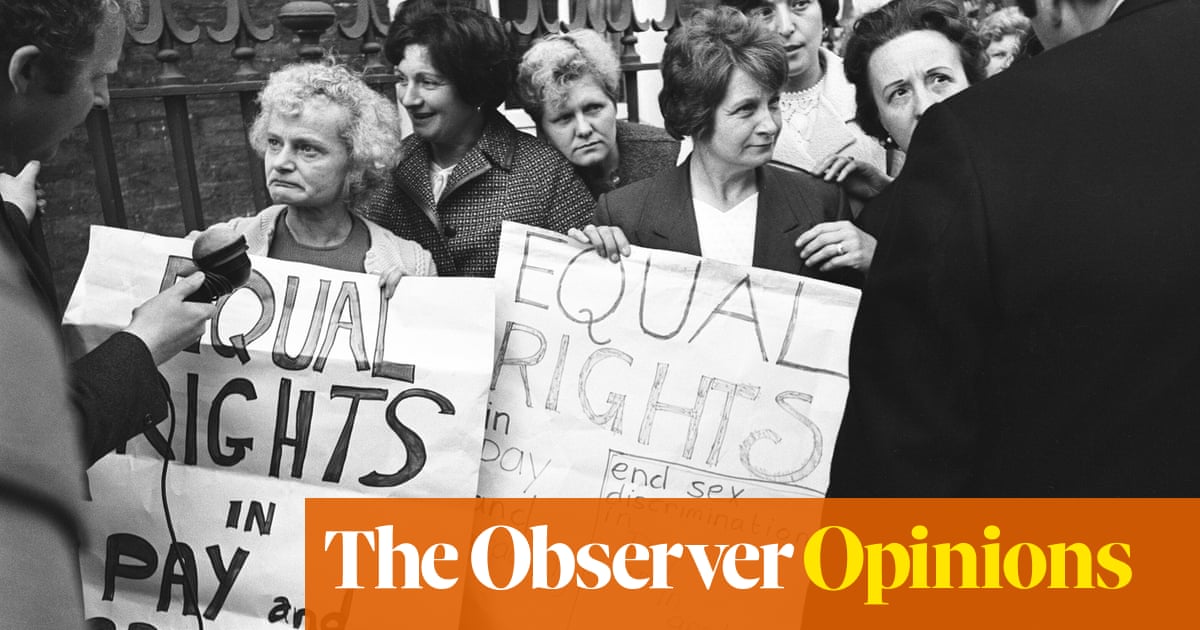Blame the erosion of trade union power, not migrants, for poor wages | Kenan Malik - 5 minutes read

These three claims may seem contradictory. They do so only because our ways of thinking have become so polarised, by Brexit among other issues, that we often find it difficult to view issues in the round. So, in the current debate about labour shortages and the need for a “high-wage, high-skill, high-productivity” economy, immigration has become either the solution or the problem. On the one side, there’s a tendency to argue that employers don’t try to use immigration to cheapen labour costs; on the other, in Boris Johnson’s words, that “low wages, low growth, low skills and low productivity” are the product of “uncontrolled immigration”. Neither is true.
A classic illustration was that of Ford sewing machinists in Dagenham in 1968, dramatised in the film Made in Dagenham. Ford peremptorily regraded the women’s jobs from “skilled” to “less skilled”, meaning they would be paid 15% less than male colleagues. The women took strike action and eventually reversed the policy, helping pave the way for the 1970 Equal Pay Act.
Women have always been a major part of the labour force. Yet, until relatively recently, they were regarded as usurpers of men’s jobs and resented for creating downward pressure on wages. In 1875, TUC secretary Henry Broadhurst claimed that trade unions should ensure that women remain “in their proper sphere at home, instead of being dragged into competition for livelihood against the great and strong men of the world”. After the Second World War, the TUC applauded the closure of wartime nurseries, encouraging working women to return to domesticity so as to, in the words of its 1948 annual report, avoid “doing a great injury to the life of the nation”.
Few today would argue that women should be excluded from the labour force to stop them being exploited as cheap labour. Most would insist on campaigning for equal pay. It should be no different when it comes to migrant workers. The best way to protect wages is not by scapegoating migrants, but by taking action to ensure that all workers have decent pay and conditions.
In any case, the claim that immigration is responsible for low wages and productivity in Britain strains credulity. Of the 27 EU countries, 20 show higher productivity than the UK. Of these, six – Germany, Ireland, Austria, Sweden, Spain and Estonia – have higher foreign-born populations than Britain. They also have smaller proportions of low-paid workers and more equal societies. There is no simple relationship between immigration, productivity and wage levels.
Studies have also shown that EU migration had little impact on British wages. Some research suggests that workers at the bottom of the labour market suffered a small decrease. The impact, though, was slight and the benefits for even for the least well paid outweighed the disadvantages. Of course, a sudden labour shortage in a small but vital sector, such as HGV drivers, can push up wages. But that is neither a permanent solution to low pay in the sector, nor contradicts the empirical evidence that immigration, by creating demand as well as supply, does not necessarily affect wages.
Nor has recent immigration reduced productivity in Britain. Between 2000 and 2008, productivity rose sharply and the arrival in 2004 of large numbers of migrants from eastern European countries had no impact. It was the financial crisis of 2008 that saw productivity plummet, since when recovery has been slow.
Rather than looking to immigration to explain low wages, low productivity and high inequality in Britain, we would do better to think about how social and economic policies since the 1980s have helped create a flexible, deregulated labour market. And how this, combined with the erosion of the power of trade unions, has allowed for the exploitation of relatively cheap labour rather than capital investment.
Trade union membership fell from 13.2m in 1979 to a record low of 6.2m in 2016, since when it has slightly recovered to 6.5m last year. Fewer than one in four employees is unionised. Those who most need union protection – such as workers in the gig economy – are least likely to be unionised, though new organisations such as the IWGB are beginning to address this.
Studies in many countries show the importance of unionisation and collective bargaining in raising wages. Between 1937 and 1979, union membership in Britain doubled while the share of income going to the top 1% fell by two-thirds. Between 1979 and 2014, membership of unions fell by a half and the share of income for the richest 1% more than doubled. In America, too, there is “consistent evidence that unions reduce inequality”.
Tories may celebrate a shortage of HGV drivers pushing up wages, but none has any desire to restore trade union power, the single most effective way of defending working-class living standards. When workers do take action to improve wages and conditions, the Tory response has been to threaten greater curbs on union activity. Four of the current cabinet – Priti Patel, Kwasi Kwarteng, Dominic Raab and Liz Truss – were, together with Chris Skidmore, authors of the infamous Britannia Unchained manifesto, which derided British workers as among “the worst idlers in the world” and demanded greater scope for employers to sack them.
This is a government that has overseen a health system in which nurses’ pay has fallen in real terms by 5% since 2010. One that has presided over a social care system in which support workers earn £17,695 a year and are likely to take a real-term pay cut under the latest care proposals. And how does it aim to deal with a shortage of care workers? Not by providing sufficient funding to raise wages but by introducing a new “health and social care visa” to import labour from abroad.
Source: The Guardian
Powered by NewsAPI.org